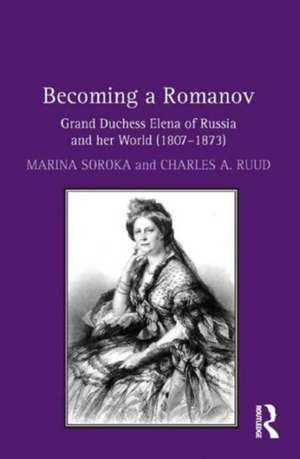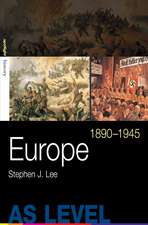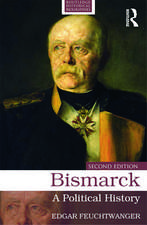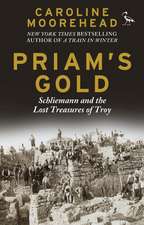Becoming a Romanov. Grand Duchess Elena of Russia and her World (1807–1873)
Autor Marina Soroka, Charles A. Ruuden Limba Engleză Hardback – 28 mai 2015
| Toate formatele și edițiile | Preț | Express |
|---|---|---|
| Paperback (1) | 391.79 lei 6-8 săpt. | |
| Taylor & Francis – 30 iun 2021 | 391.79 lei 6-8 săpt. | |
| Hardback (1) | 1012.10 lei 6-8 săpt. | |
| Taylor & Francis – 28 mai 2015 | 1012.10 lei 6-8 săpt. |
Preț: 1012.10 lei
Preț vechi: 1234.26 lei
-18% Nou
Puncte Express: 1518
Preț estimativ în valută:
193.66€ • 202.20$ • 160.28£
193.66€ • 202.20$ • 160.28£
Carte tipărită la comandă
Livrare economică 04-18 aprilie
Preluare comenzi: 021 569.72.76
Specificații
ISBN-13: 9781472457011
ISBN-10: 1472457013
Pagini: 352
Ilustrații: Includes 23 b&w illustrations
Dimensiuni: 156 x 234 x 21 mm
Greutate: 0.79 kg
Ediția:Revised
Editura: Taylor & Francis
Colecția Routledge
Locul publicării:Oxford, United Kingdom
ISBN-10: 1472457013
Pagini: 352
Ilustrații: Includes 23 b&w illustrations
Dimensiuni: 156 x 234 x 21 mm
Greutate: 0.79 kg
Ediția:Revised
Editura: Taylor & Francis
Colecția Routledge
Locul publicării:Oxford, United Kingdom
Cuprins
Becoming a Romanov. Grand Duchess Elena of Russia and her World (1807–1873)
Notă biografică
Marina Soroka has a PhD in history from the University of Western Ontario and published Britain, Russia and the Road to the First World War: The Fateful Embassy of Count Aleksandr Benckendorff (1903-16) with Ashgate in 2011. Charles A. Ruud is Professor Emeritus of Russian history at the University of Western Ontario.
Recenzii
"This welcome volume makes a contribution to Russian studies in two different areas. The book provides the first and long-needed biography of an unusually accomplished woman who figured prominently in the political and social life of Russia in the mid-nineteenth century. And, through an examination of the upbringing and court life of the grand duchess, the chapters add significantly to women’s history in the imperial period. As Marina Soroka and Charles A. Ruud summarize, she "was able to participate in Russian social, cultural and political life because aristocratic women ... exercised significant control over family and society" (p. xi). The volume is especially strong in charting Elena Pavlovna’s transformation from a weepy German princess, caught in a loveless marriage to Emperor Paul’s youngest son, into a brilliant salonnière and supporter of the Red Cross, the Petersburg conservatory, and the emancipation of the serfs."
Cynthia Hyla Whittaker, The Russian Review, 2016
"The book by Soroka and Ruud presents in detail the lifetime of this distinguished personality of the Russian imperial house... The authors show that, despite the strict gender-based separation of social functions in the royal family in the nineteenth century, Grand Duchess Elena Pavlovna was committed to high-profile public causes and took an active part in public life. It is certainly to the authors' credit that a huge number of facts stemming from archival materials and hard-to-access publications of correspondence of that time have been brought into scholarly circulation. All of the above will serve as the basis for future research. The book is an interesting read not only for specialists working on modern Russian history but for everyone interested in women's and gender history, as well as court society and its everyday life."
Angelina Vacheva, Aspasia, 2016
"Soroka and Ruud are imbued with great sympathy for Elena, which, while legitimate, can lead to an increased level of stylization. Deconstructing this is highly recommended for ambitious readers. You won't regret it and your efforts will ultimately be rewarded with profound insights into a fascinating world."
Matthias Stadelmann, Jahrbücher für Geschichte Osteuropas, 2018
"The book fufils a valuable role in giving a more nuanced portrait of Elena Pavlovna than has appeared before in any English-language account. Its value rests as much on the insights and vignettes scattered through the book as on any fundamental re-interpretation of the nature of the country's social and political life. It can be read with profit by any student of late Imperial Russia."
Michael Hughes, English Historical Review, 2018
Cynthia Hyla Whittaker, The Russian Review, 2016
"The book by Soroka and Ruud presents in detail the lifetime of this distinguished personality of the Russian imperial house... The authors show that, despite the strict gender-based separation of social functions in the royal family in the nineteenth century, Grand Duchess Elena Pavlovna was committed to high-profile public causes and took an active part in public life. It is certainly to the authors' credit that a huge number of facts stemming from archival materials and hard-to-access publications of correspondence of that time have been brought into scholarly circulation. All of the above will serve as the basis for future research. The book is an interesting read not only for specialists working on modern Russian history but for everyone interested in women's and gender history, as well as court society and its everyday life."
Angelina Vacheva, Aspasia, 2016
"Soroka and Ruud are imbued with great sympathy for Elena, which, while legitimate, can lead to an increased level of stylization. Deconstructing this is highly recommended for ambitious readers. You won't regret it and your efforts will ultimately be rewarded with profound insights into a fascinating world."
Matthias Stadelmann, Jahrbücher für Geschichte Osteuropas, 2018
"The book fufils a valuable role in giving a more nuanced portrait of Elena Pavlovna than has appeared before in any English-language account. Its value rests as much on the insights and vignettes scattered through the book as on any fundamental re-interpretation of the nature of the country's social and political life. It can be read with profit by any student of late Imperial Russia."
Michael Hughes, English Historical Review, 2018
Descriere
Becoming a Romanov offers a new understanding of Russian and international events of the era, the Romanovs’ role in them, the degree of autonomy enjoyed by high-born women in Russia and the ways in which new ideas gained ground in the nineteenth-century Russian empire. Based on abundant and largely unused archival sources, published documents and literature of the period in French, Russian, German, Italian and English, this is the first book about Grand Duchess Elena and it expertly interweaves the story of a woman’s life with that of Imperial Russian high politics.












